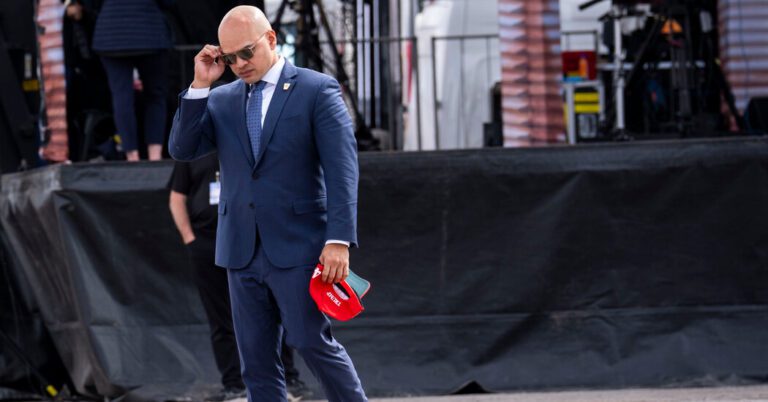
[ad_1]
Almost from the moment former President Donald J. Trump was charged last June with mishandling a trove of highly secret classified documents, the spotlight in the case has been fixed — as it usually is — on him.
But on Friday afternoon, the focus will shift, at least briefly, to Mr. Trump’s two co-defendants, Walt Nauta and Carlos De Oliveira. Their lawyers will square off in court with federal prosecutors in an effort to have the charges they are facing dismissed.
Prosecutors say that both men — who still work for Mr. Trump at Mar-a-Lago, his private club and residence in Florida — conspired with the former president to hide boxes containing classified material from the government and then took part in a related plot to destroy security camera footage of the boxes being moved. The men have also been accused of lying to investigators.
In some sense, Mr. Nauta, a personal aide who met Mr. Trump while serving as a valet at the White House, and Mr. De Oliveira, who rose at Mar-a-Lago from parking cars to working as the property manager, are merely supporting players in the larger drama starring Mr. Trump.
But at the same time, they are central to the case because they both play leading roles in the allegations that Mr. Trump willfully conspired to obstruct the investigation. Those accusations have not only deepened Mr. Trump’s own criminal liability, but have also served to set his case apart from other inquiries into classified materials involving public officials like President Biden and former Vice President Mike Pence.
When lawyers for the men stand up on Friday in Federal District Court in Fort Pierce, Fla., they are likely to attack these conspiracy allegations. In written filings, they have already told Judge Aileen M. Cannon, who is handling the case, that even though their clients may have been following orders from Mr. Trump, they could not have joined him in a plot to hide classified materials they knew nothing about or in obstructing an investigation they never knew existed.
Mr. Nauta, for example, stands accused of moving 64 boxes out of a storage room at Mar-a-Lago and taking them to Mr. Trump’s living quarters at a critical moment: in the days before one of Mr. Trump’s lawyers was set to go through them looking for classified material in compliance with a federal subpoena.
But as his lawyer, Stanley Woodward Jr., argued in court papers, the indictment does not specifically assert that Mr. Nauta “knew that there were classified documents on premises” of Mar-a-Lago or precisely what Mr. Trump intended to do with the boxes he was given.
“How could providing documents for President Trump to review prior to subpoena compliance be an act that obstructs justice?” Mr. Woodward wrote.
Mr. De Oliveira has been charged with helping Mr. Nauta carry about 30 of the boxes from Mr. Trump’s residence back to the storage room on the day the lawyer, M. Evan Corcoran, arrived at Mar-a-Lago to conduct his search.
But according to his lawyer, John Irving, Mr. De Oliveira also had no idea that there was classified material in the boxes or had any knowledge that Mr. Corcoran was about to search them as part of a federal investigation.
Mr. Irving has stated in court papers that what his client did was not a “surreptitious” effort to avoid government scrutiny, as prosecutors have claimed. Instead, he has maintained, the 30 boxes that Mr. De Oliveira helped return to the storage room were “the very boxes” that Mr. Corcoran “reviewed only hours after they were moved.”
Mr. Nauta and Mr. De Oliveira both have also been charged with taking part in a second plot — to strong-arm Mar-a-Lago’s I.T. expert, Yuscil Taveras, into getting rid of video footage of the boxes being moved. This scheme began, prosecutors say, with Mr. Nauta rushing back to the property shortly after the government issued a subpoena for the footage and persuading Mr. De Oliveira to approach Mr. Taveras.
A few days later, prosecutors say. Mr. De Oliveira spoke privately with Mr. Taveras in a small room near his office at Mar-a-Lago, telling Mr. Taveras that “the boss” wanted the server containing the footage deleted. When Mr. Taveras said he did not have the authority to do that, prosecutors say Mr. De Oliveira responded with a question: “What are we going to do?”
Lawyers for both Mr. De Oliveira and Mr. Nauta have contested this account, which Mr. Taveras is likely to repeat on the witness stand at trial. The lawyers have also argued that none of the footage was actually deleted, suggesting further that even if Mr. De Oliveira had asked Mr. Taveras to get rid it of it, that does not mean he understood its destruction was designed to disrupt the investigation.
Motions to dismiss a case before it goes to trial are often difficult to win. Still, Judge Cannon, who was appointed by Mr. Trump in his waning days in office, has over the past few months engaged with — or even seemed to embrace — some of Mr. Trump’s own defenses in a way that many federal judges would not have.
Prosecutors have argued that motions to dismiss, like those to be discussed on Friday, are meant to raise legal issues, not to question the sufficiency of the evidence in an indictment. They have suggested that the arguments advanced by Mr. Nauta and Mr. De Oliveira are better handled as disputes at trial.
[ad_2]